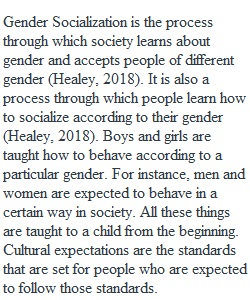


Q Discussion Post minimum requirements • 400-500 words of substantive content • Use two quotes from the readings or outside sources (citations needed) • Due: May 6 at 11:59 PM Peer Responses minimum requirements • Post at least two responses, totaling about 400 words • Due: May 8 at 11:59 PM You will need to post your answer to one of the prompts below before seeing the posts of your classmates. This is to ensure that you will not be swayed by the opinions or responses of others in the class. PLEASE NOTE: Respond to a peer's post that is different from the topic of your initial post. So for example, if your initial post answers Prompt #1, you should respond to a peer's post that answers a different prompt number (e.g. #2-#6). ________________________________________ Select one discussion prompt from the following: 1. How can gender role expectations become self-fulfilling prophecies? Provide an example. 2. Do you remember a time in your childhood when you first realized your gender expectation roles? What happened? 3. Name a time in which you violated a gender norm. What was the norm you violated? How did people respond to you? How did this make you feel? 4. What are invisible privileges? Provide examples of three invisible privileges men have in society. 5. How does gender socialization create cultural expectations for boys/men and girls/women? 6. Discuss three steps that individuals can personally take to combat homophobia and homophobic tendencies. Why is it difficult for some individuals to take a public stance against homophobia? 7. In what ways might partners of color feel exoticized?
View Related Questions